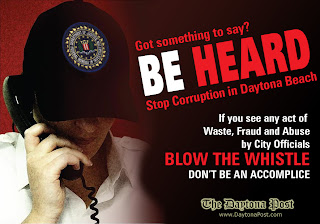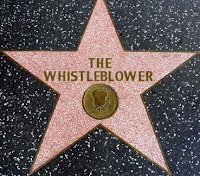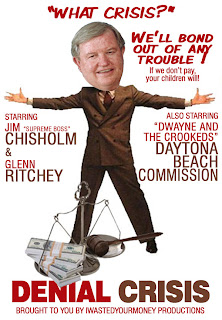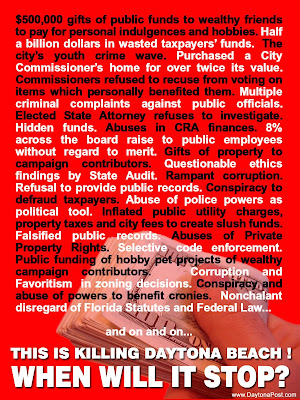Whistle-blower Laws protect Daytona Beach City Employees when exposing illegal acts of their superiors
Public Officials at the City of Daytona Beach have been alleged to effect retaliatory measures against employees for acting as whistle-blowers after witnessing wrongful acts. The mere threat of retaliatory action has been effective in chilling dissent and even potential cooperation with law enforcement authorities. However, by remaining silent, an otherwise innocent employee could be considered an accomplice should the wrongful conduct be discovered. The duty to report a crime is a universal duty. It’s important to encourage and protect whistle-blowers—they’re the ones who expose the wrongdoing. Faced with such a situation, exposing the malfeasance can be the only reasonable option. Take the case of Douglas Durand, who had joined pharmaceutical company TAP as Vice President of Sales. He was immediately troubled by what he saw as TAP's "cowboy" culture. He told People magazine that after he heard about an alleged kickback plan involving sales of the drug Lupron, he realized the extent of his personal exposure. "The sales force was my responsibility," he told the magazine. "I could have been the one to get hung out to dry.". As is often the case, when malfeasance is discovered, the powerful always try to deflect blame to their underlings. Duran was awarded almost $90 Million as reward for exposing the malfeasance in the qui tam case. Although the law concerning whistle-blower retaliation and protection can vary a lot depending on your own particular situation, certain fact patterns seem to recur frequently: After being fired from the Central Florida Lions Eye & Tissue Bank, Marlene Maisonville provided powerful testimony when describing that she was axed for complaining of falsified records and repeated misuse of equipment which led to unhealthy tissue transplants. Maisonville also complained of sexual harassment. Jurors awarded her $132,380 for lost wages and emotional pain and suffering. Government workers also benefit from special Whistle-blower laws. Frederick Bothe, a former supervisor at a Delray Beach water treatment plant, filed a lawsuit alleging he was fired for reporting that chemicals were pumped into wells containing drinking water. Palm Beach County officials concluded Delray Beach was illegally discharging water from its facility. Delray Beach settled the case with a pre-trial payment of $28,500. A U.S. district judge in Florida awarded a whistle-blower 24 percent of an $85.7 million Medicare fraud settlement, noting that "only his dogged resolution, eventually supported by competent professionals and an occasionally reluctant government," achieved the settlement. A former employee of the General Electric Company was awarded $13.4 million by a Federal judge for bringing forward evidence that the company defrauded the United States in a scandal involving the sale of military jet engines to Israel. Florida's Whistle-blower Act (Florida Statutes Sections 112.3187 and 112.31895) provides recourse to workers who believe their bosses punished them for encouraging adherence to local ordinances, regulations and state and federal laws. The law provides workers with protections in three types of circumstances: Florida's Supreme Court made the Whistle-blower Act even more employee-friendly. Some trial judges had been dismissing Whistle-blower lawsuits where workers objected verbally but not in writing to illegal acts committed by the entities employing them or when refusing to participate in the wrongful conduct. Supreme Court Justices have notified trial judges that the requirement that workers first provide written warnings to employers be applied only where employees reported misconduct to governmental agencies or threatened to do so. Workers are not required to first provide employers with written notice that they oppose illegal actions taking place on the job. Although such documentation is not always required, workers are better able to document that they did oppose illegal conduct by lodging these complaints in writing. Letters sent via certified, return receipt mail (with a photocopy of the letter kept) and those faxed (with proof of fax transmission kept) enable workers to later verify that they notified employers of their opposition to illegal acts. Employees who wage successful Whistle-blower lawsuits are entitled to compensation for their economic damages, which may include back wages and reduced future earnings. Additional monies may be awarded for emotional pain and suffering. Also, the Whistle-blower Act may require that the losing party pay the winner's attorneys fees and certain litigation expenses. Certain Whistle-blower claims permit employees to recover an amount equal to double their economic damages unless their employers are able to prove acts committed against the worker occurred in good faith. Retaliatory employment actions less severe than firings are also made illegal. Demotions, wage reductions, suspensions, reductions in benefits, bad faith decisions concerning transfers and denials of raises and promotions are also illegal forms of Whistle-blower punishment. When retribution takes the form of bad-mouthing, whistle-blower victims often may sue for defamation of character. Florida's defamation law specifically permits awards for punitive damages. Persons who complain of discrimination targeting themselves or others are also susceptible to punishment. Retaliation provisions in state and federal anti-discrimination laws also permits the awarding of punitive damages for these types of Whistle-blower claims. However, the "original source" must also be the first to file a federal civil complaint for recovery of the federal funds fraudulently obtained, and must avoid publicizing the claim of fraud until the U.S. Justice Department decides whether to prosecute the claim itself. Such qui tam lawsuits must be filed under seal, using special procedures to keep the claim from becoming public until the federal government makes its decision on direct prosecution. If you believe whistle-blower protection might apply in your situation, contact an experienced whistle-blower retaliation attorney to protect your rights. Time is of the essence as Florida Law has statutes of limitations that expire as soon as 30 days from the retaliatory offense in certain cases. The State Attorney has the duty of prosecuting any and all cases involving criminal wrongdoing. The world is a dangerous place to live; not because of the people who are evil, but because of the people who don't do anything about it. Sources: Florida Statutes, Broward Bar Association A "whistle-blower" is an employee, former employee, or member of an organization, especially a business or government agency, who reports misconduct to people or entities that have the power and presumed willingness to take corrective action. The misconduct may be a violation of a law, rule, regulation and/or a direct threat to public interest, such as fraud, health/safety violations, and corruption.
A "whistle-blower" is an employee, former employee, or member of an organization, especially a business or government agency, who reports misconduct to people or entities that have the power and presumed willingness to take corrective action. The misconduct may be a violation of a law, rule, regulation and/or a direct threat to public interest, such as fraud, health/safety violations, and corruption.
The term whistle-blower derives from the practice of English bobbies, who would blow their whistles when they noticed the commission of a crime. The whistle would alert both law enforcement officers and the general public of danger.
Honesty should be the best policy. But too often, bosses retaliate against workers who object when employers break laws or ask workers to participate in illegal acts. Although Florida's Whistle-Blower law should stop government officials from lashing out against employees who object to wrongdoing or report it, many workers claim that their efforts to force ethical employer behavior have led to demotions, firings and other types of punishment.
 Drew Rosen, a one-time manager at a Miami-Dade County building supply company, thought he was doing the right thing by informing upper management that he believed co-workers were intentionally deceiving customers about the firm's products. Instead of being commended, the five year employee was transferred to what he says was a less desirable position in Arizona. Rosen says KCG, Inc. also cheated him out of valuable stock options. Despite KCG, Inc.'s claims that Rosen failed to properly exercise his stock options and that the transfer was routine, a judge ordered the company to pay him $325,000.
Drew Rosen, a one-time manager at a Miami-Dade County building supply company, thought he was doing the right thing by informing upper management that he believed co-workers were intentionally deceiving customers about the firm's products. Instead of being commended, the five year employee was transferred to what he says was a less desirable position in Arizona. Rosen says KCG, Inc. also cheated him out of valuable stock options. Despite KCG, Inc.'s claims that Rosen failed to properly exercise his stock options and that the transfer was routine, a judge ordered the company to pay him $325,000.
 Those who report a false claim against the federal government, and suffer adverse employment actions as a result, may have up to six years (depending on state law) to file a civil suit for remedies under the U.S. False Claims Act (FCA). 31 U.S.C. § 3730(h). Under a qui tam provision, the "original source" for the report may be entitled to a percentage of what the government recovers from the offenders. This percentage can be 15% to 30% of any damages recovered in cases where the government is defrauded. In a many cases, government whistle-blowers have received awards of millions of dollars.
Those who report a false claim against the federal government, and suffer adverse employment actions as a result, may have up to six years (depending on state law) to file a civil suit for remedies under the U.S. False Claims Act (FCA). 31 U.S.C. § 3730(h). Under a qui tam provision, the "original source" for the report may be entitled to a percentage of what the government recovers from the offenders. This percentage can be 15% to 30% of any damages recovered in cases where the government is defrauded. In a many cases, government whistle-blowers have received awards of millions of dollars.What to do
Further Reading:
Public Corruption - FBI's Top Criminal Priority
Florida's Advocates for Employees Rights
Whistle-blower Protection Blog
4 comments:
The system is broken and that is why corruption in Daytona Beach is so widespread. The public officials responsible for the checks and balances are controlled by people benefiting from the malfeasance and who have a vested interest in preventing its investigation and prosecution.
Send us an email with your phone number. All personal information will be kept confidential.






